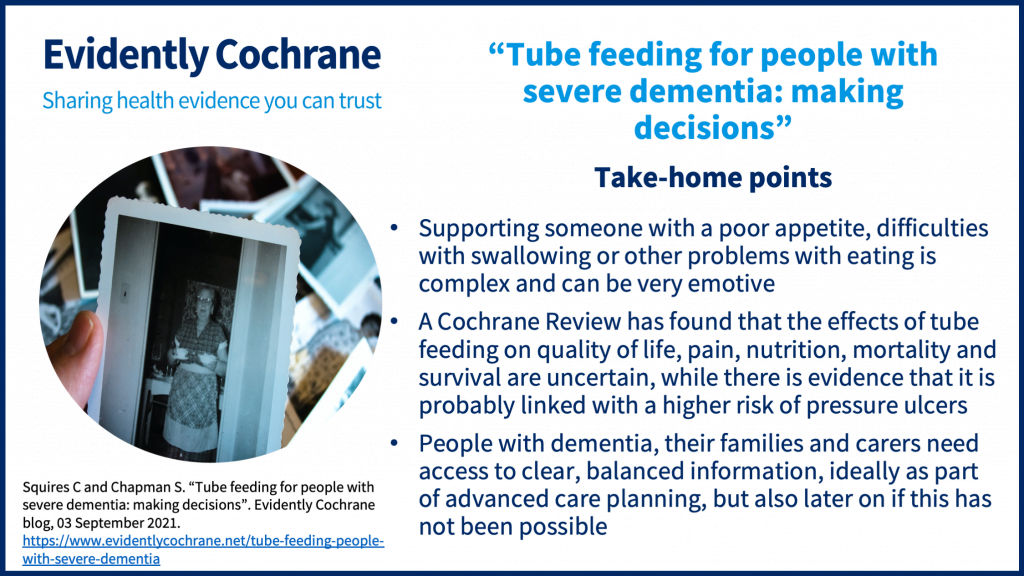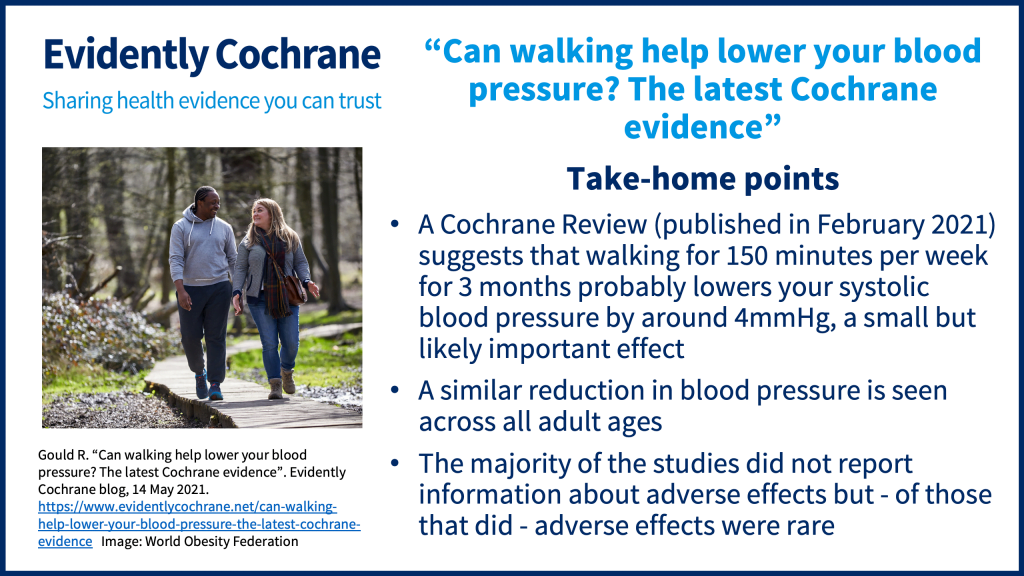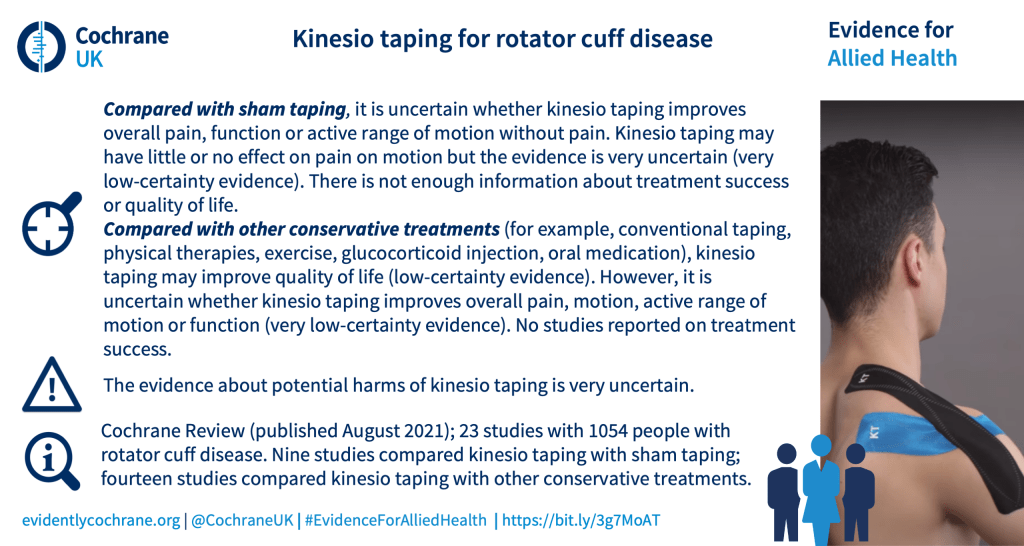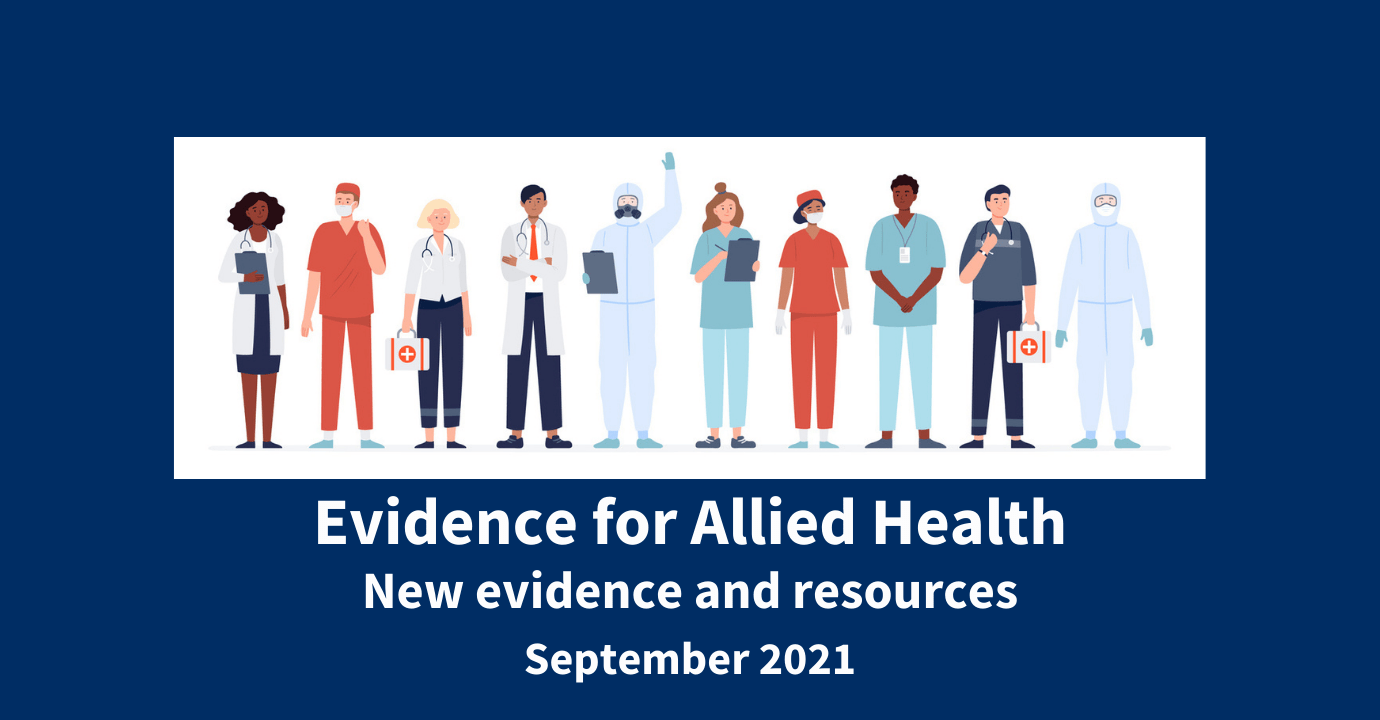The latest evidence and resources for allied health professionals and clinical support staff. You can either scroll through this page or click on any of the links below to jump to the relevant section.
Please note, unlike the rest of our blogs, our ‘Evidence for Allied Health: new evidence and resources’ blogs will not be updated.
Helping you keep up-to-date with evidence
We are now changing these blogs from quarterly to every two months, bringing you new evidence more quickly, and now giving you the bottom line of the Cochrane Reviews we include. You can still give your feedback on our content – how can we make it more useful for you?
- COVID-19
- Air pollution
- Cardiac rehabilitation
- COPD
- Delirium prevention
- Dementia
- Dietary salt for people with chronic kidney disease
- Hypertension – walking
- Interstitial lung disease
- Lifestyle modifications for people with non-alcohol-related fatty liver disease
- Nutritional supplementation for non-alcohol‐related fatty liver disease
- Reducing sedentary behaviour in older adults
- Rotator cuff disease
- Shoulder pain
- Spatial neglect/inattention following stroke or adult brain injury
- Opportunities, news and events
COVID-19
COVID-19
This year, Cochrane is continuing to produce new and updated reviews in response to the pandemic. We have blogged about many of them and this blog COVID-19 evidence: a Cochrane round-up brings together a large collection of evidence and resources, starting from when this evidence was first being produced in spring 2020. Like the reviews themselves, all our blogs are updated to reflect new evidence.
Cochrane Special Collections
Cochrane Special Collections assemble Cochrane Reviews on important topics for the prevention and treatment of COVID-19. They are developed with experts from our global Cochrane network. They are based on World Health Organization interim guidance, and continuously updated. You can find Coronavirus (COVID-19) Special Collections here.
Those updated in July include:
- Coronavirus (COVID-19): remote care through telehealth
- Coronavirus (COVID-19): infection control and prevention measures
- Coronavirus (COVID-19): evidence relevant to critical care
Cochrane Podcasts
Cochrane COVID-19 Podcasts offer short summaries of Cochrane COVID-19 reviews from the authors themselves. A good way to hear the latest Cochrane evidence in under 5 minutes each.
Cochrane Clinical Answers
Cochrane Clinical Answers (CCAs) provide a readable, digestible, clinically-focused entry point to rigorous research from Cochrane Reviews. They are designed to be actionable and to inform point-of-care decision-making. Each CCA contains a clinical question, a short answer, and data for the outcomes from the Cochrane Review deemed most relevant to practising healthcare professionals. The evidence is displayed in a user-friendly tabulated format that includes narratives, data, and links to graphics.
You can find Cochrane Clinical Answers related to COVID-19 here.
Air pollution
Cochrane news item: What can individuals do to avoid the effects of air pollution?
Cardiac rehabilitation
Cochrane Clinical Answer: What are the effects of exercise‐based cardiac rehabilitation for adults after heart valve surgery?
COPD
Cochrane Clinical Answer: For adults with chronic obstructive pulmonary disease (COPD), what are the effects of telerehabilitation?
Delirium prevention
Delirium is common in hospitalised patients. The authors of a Cochrane Review on Non‐pharmacological interventions for preventing delirium in hospitalised non‐ICU patients (July 2021) have concluded:
- “There is moderate‐certainty evidence regarding the benefit of multicomponent non‐pharmacological interventions for the prevention of delirium in hospitalised adults, estimated to reduce incidence by 43% compared to usual care.
- We found no evidence of an effect on mortality.
- There is emerging evidence that these interventions may reduce hospital length of stay, with a trend towards reduced delirium duration, although the effect on delirium severity remains uncertain.”
Dementia
Our blog Tube feeding for people with severe dementia: making decisions includes professional and personal reflections, plus practical advice and resources.

There is also a Cochrane Clinical Answer: What are the benefits and harms of enteral tube feeding for people with severe dementia?
Dietary salt for people with chronic kidney disease
Dietary salt for people with chronic kidney disease
The authors of a Cochrane Review Altered dietary salt intake for people with chronic kidney disease (June 2021) found high-certainty evidence that salt reduction reduced blood pressure in people with chronic kidney disease (CKD), and albuminuria in people with earlier stage CKD in the short‐term. They state that “if such reductions could be maintained long‐term, this effect may translate to clinically significant reductions in CKD progression and cardiovascular events. Research into the long‐term effects of sodium‐restricted diet for people with CKD is warranted.”
Hypertension – walking
Cochrane Clinical Answer: What are the benefits and harms of walking to prevent and control hypertension?
There is also an Evidently Cochrane blog Can walking help lower your blood pressure? The latest Cochrane evidence.

Interstitial lung disease
Cochrane Clinical Answer: What are the effects of pulmonary rehabilitation for people with interstitial lung disease?
Lifestyle modifications for people with non-alcohol-related fatty liver disease
Cochrane Clinical Answer: For people with non–alcohol‐related fatty liver disease, how do lifestyle modifications compare?
Nutritional supplementation for non-alcohol‐related fatty liver disease
The authors of the Cochrane Review Nutritional supplementation for nonalcohol‐related fatty liver disease: a network meta‐analysis (July 2021) conclude that “The evidence indicates considerable uncertainty about effects of nutritional supplementation compared to no additional intervention on all clinical outcomes for people with non‐alcohol‐related fatty liver disease.”
Reducing sedentary behaviour in older adults
In a Cochrane news item Get up, stand up: new review looks at reducing sedentary behaviour in older adults the lead author of the review Interventions for reducing sedentary behaviour in community‐dwelling older adults (June 2021) discusses the findings.
Rotator cuff disease
A Cochrane Review Kinesio taping for rotator cuff disease was published in August 2021. Here is a summary:

Shoulder pain
Shoulder pain
The Cochrane Review Image‐guided glucocorticoid injection versus injection without image guidance for shoulder pain was updated in August 20121. The review authors conclude “Our updated review does not support use of image guidance for injections in the shoulder.”
Ultrasound‐guided injection (compared with injection without imaging) probably provides little or no benefit in terms of pain or function and may make little or no difference to quality of life. The effect on patient-rated treatment success is uncertain. No serious adverse events were reported in any trial.
Spatial neglect/inattention following stroke or adult brain injury
The authors of a Cochrane Review Non‐pharmacological interventions for spatial neglect or inattention following stroke and other non‐progressive brain injury (July 2021) have concluded that “no rehabilitation approach can be supported or refuted based on current evidence from RCTs. As recommended by a number of national clinical guidelines, clinicians should continue to provide rehabilitation for neglect that enables people to meet their rehabilitation goals. Clinicians and stroke survivors should have the opportunity, and are strongly encouraged, to participate in research.”
Opportunities, news and events
Cochrane Nutrition have a newsletter and invite you to sign up to keep up with nutrition evidence and news.
Our colleagues at Cochrane Rehabilitation describe their function as “a bridge between Cochrane and all Rehabilitation stakeholders. On one side, it drives evidence and methods developed by Cochrane to the world of Rehabilitation, and on the other, it conveys priorities, needs and specificities of Rehabilitation back to Cochrane.” Learn more from their recent conversation with Science in the Break.
On this page, Important Cochrane Links, you can find opportunities to get involved, including how to join Cochrane, find volunteer tasks, or jump into the Cochrane Library.
This year World Evidence-Based Healthcare (EBHC) Day will be on October 20. Cochrane and six other leaders in evidence-based health care put the spotlight on the global impact of evidence on healthcare research, policy, practice and health outcomes. Read here about the Launch of World Evidence-Based Healthcare Day 2021: the role of evidence in an infodemic.
Please note that this page includes a round-up of materials mainly published within the last two months, and is not updated after it’s posted.
Join in the conversation on Twitter with @SarahChapman30 and @CochraneUK or leave a comment on the blog.
Please note, we cannot give medical advice and do not publish comments that link to individual pages requesting donations or to commercial sites, or appear to endorse commercial products. We welcome diverse views and encourage discussion but we ask that comments are respectful and reserve the right to not publish any we consider offensive. Cochrane UK does not fact check – or endorse – readers’ comments, including any treatments mentioned.



This blog highlights the latest evidence and resources for allied health professionals, providing valuable insights into the latest developments in this field. The focus on evidence-based practices is commendable, as it promotes the use of proven approaches to improve patient outcomes. Allied health professionals can benefit greatly from staying up-to-date with the latest evidence and resources, and this blog post is a useful tool in that regard. Thanks for sharing!
But I’m curious if there have been any recent developments or studies specifically on the effectiveness of certain allied health interventions for chronic pain management. Any insights on this topic would be greatly appreciated!